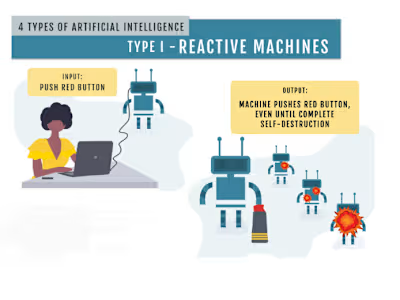Sample 2
What is a Limited Memory? & its Types, use, pros, and cons.
In the realm of artificial intelligence (AI), limited memory plays a crucial role in enabling machines to store and retrieve information. As AI continues to advance, understanding the concept of limited memory becomes essential for both developers and users alike.
TABLE OF CONTENT
What is the Limited Memory?
Types of Limited Memory?
How Does a Limited Memory Work?
Advantages and Disadvantages of Limited Memory?
Conclusion
FAQs
1. What is Limited Memory?
Limited memory refers to the finite amount of information that our brains can hold and recall at any given time. Just like a computer with a fixed amount of RAM, our minds have the capacity to retain only a certain volume of data before it starts to get overwhelmed. This limitation varies from person to person, as each individual has a unique memory capacity.
i) The Capacity of Limited Memory:
Think of limited memory as a container with a fixed size. It can only accommodate a certain number of memories or pieces of information. Some individuals may have a larger container, allowing them to hold and recall more details, while others may have a smaller one, leading to a relatively restricted memory capacity. This capacity is influenced by various factors, including genetics, age, and overall cognitive health.
ii) Examples of Limited Memory:
Forgetting Names:
Have you ever met someone new and struggled to remember their name moments later? This common experience showcases limited memory in action. Our minds may struggle to retain and recall new names due to the limited capacity of our memory systems.
Misplacing Items:
Misplacing everyday items, such as keys or wallets, can be attributed to limited memory. With numerous details competing for our attention, it becomes challenging to remember where we put specific items, especially when they aren't stored in their usual locations.
Exam Preparation:
During exam preparation, students often face the challenge of limited memory. Trying to memorize a vast amount of information within a short period can be overwhelming. Students must prioritize and focus on key concepts to make the most of their limited memory capacity.
Forgetting Past Events:
As time goes by, our memories of past events tend to fade. We may struggle to recall specific details or even forget entire experiences. This gradual forgetting exemplifies the limitations of long-term memory and the inevitability of limited memory capacity.
2. Types of Limited Memory
i) Sensory Memory:
Sensory memory is the first stage of memory processing, responsible for briefly holding sensory information from our surroundings. It allows us to retain visual, auditory, and other sensory inputs for a brief period, typically ranging from a fraction of a second to a few seconds. but, this type of memory has a limited capacity and quickly fades unless it is transferred to other memory systems.
ii) Short-Term Memory (STM):
Short-term memory, also known as working memory, is responsible for temporarily storing and manipulating information for immediate use. It acts as a mental workspace where we actively hold and manipulate a limited amount of information, such as phone numbers or a series of instructions. The capacity of STM is limited, typically allowing for the retention of only around seven (plus or minus two) items for a short duration, typically up to 30 seconds.
iii) Long-Term Memory (LTM):
Long-term memory involves the storage of information over a longer duration, ranging from days to years or even a lifetime. It has a vast capacity to retain an immense amount of information, including facts, experiences, and skills. Unlike sensory and short-term memory, long-term memory is relatively permanent and can be accessed and retrieved when needed. but, retrieving information from long-term memory may require effort and cues.
iv) Episodic Memory:
Episodic memory pertains to our ability to recall specific events and experiences from our past. It allows us to remember details such as time, place, emotions, and associated sensory information. Episodic memory is limited in the sense that we tend to forget or inaccurately recall certain aspects of past events over time.
v) Semantic Memory:
Semantic memory deals with our general knowledge and understanding of concepts, facts, and language. It encompasses our understanding of words, definitions, historical events, and other general information. While semantic memory has a seemingly vast capacity, we may still face limitations in recalling specific details or nuances.
vi) Procedural Memory:
Procedural memory is responsible for encoding and storing motor skills, habits, and learned procedures. It plays a crucial role in tasks that involve motor coordination, such as riding a bicycle or playing a musical instrument. Procedural memory is often less susceptible to forgetting, as repeated practice strengthens the neural connections associated with the learned skills.
3. How Does a Limited Memory Work?
Limited memory AI is different from reactive machines because it can remember things from the past and keep an eye on specific objects or situations as time goes on. These observations are then stored in the AI's programming, so it can use both past and present information to make decisions and take actions.
i) Encoding:
Encoding is an important process that helps us take information from the outside world and put it into our memory. It's like converting the things we see, hear, and feel into a language our brains can understand and keep track of. but, because our memory has limits, not all information can be encoded in the same way. Our minds have a tendency to choose what's important, interesting, or emotionally impactful to remember, while the less important or less significant details are often ignored or forgotten.
ii) Storage:
Once information is encoded, it moves into the storage phase of memory. Our memory system consists of different storage areas, including sensory memory, short-term memory (STM), and long-term memory (LTM). Sensory memory holds sensory impressions for a brief duration, while STM temporarily retains a limited amount of information for immediate use. LTM, with its vast capacity, stores information for longer durations, potentially a lifetime.
iii) Retrieval:
Retrieval refers to the process of accessing stored information when needed. Limited memory can pose challenges during retrieval. Sometimes, the desired information may be temporarily inaccessible or forgotten. Various factors, such as interference from other memories or insufficient retrieval cues, can affect our ability to recall information accurately. However, employing memory strategies and cues can enhance retrieval and overcome the limitations of limited memory.
iv) Forgetting:
Forgetting is an inherent aspect of limited memory. Our minds naturally discard or lose access to certain memories over time. Theories suggest that forgetting occurs due to interference from new memories, decay of memory traces, or insufficient retrieval cues. While forgetting may be frustrating, it is an essential adaptive mechanism that allows us to focus on relevant and current information.
v) Working within Limitations:
Understanding the workings of limited memory empowers us to make the most of our cognitive abilities. By employing effective memory strategies, such as organizing information, employing mnemonic devices, and engaging in regular review and practice, we can optimize our memory performance. Additionally, recognizing the limitations of memory prompts us to seek external aids, such as note-taking or digital tools, to supplement our memory capabilities.
4. Advantages and Disadvantages of Limited Memory
By understanding the advantages and disadvantages of limited memory, we can develop strategies to maximize its benefits and mitigate its limitations.
i) Advantages of Limited Memory:
Selective Attention:
Limited memory allows us to focus our attention on relevant information and filter out unnecessary details. By prioritizing what we encode and retain, we can direct our cognitive resources toward what is most important, improving our efficiency in processing and recalling information.
Efficient Cognitive Processing:
Having a limited memory capacity encourages our brains to process information more efficiently. It pushes us to extract key insights, identify patterns, and synthesize complex ideas, as we cannot retain an unlimited amount of data. This selective processing fosters critical thinking and enhances our ability to make informed decisions.
Adaptability and Learning:
Limited memory encourages adaptability and continuous learning. As we encounter new information, we must integrate it with existing knowledge or discard outdated details. This process of updating and refining our memory banks enables us to stay current and adapt to new contexts, fostering lifelong learning and intellectual growth.
ii) Disadvantages of Limited Memory:
Forgetting and Incomplete Recollection:
One significant disadvantage of limited memory is the tendency to forget or have incomplete recollection. Over time, memories may fade, making it challenging to retrieve specific details accurately. This can lead to frustrations and inaccuracies, especially when trying to recall precise information from the past.
Overload and Overwhelm:
Limited memory can become overwhelmed when faced with an excessive amount of information. Information overload can lead to difficulties in processing, organizing, and retaining new knowledge. It can also contribute to cognitive fatigue, impairing our ability to focus and make sound judgments.
Missed Opportunities:
Due to limited memory, we may miss out on capturing every single experience or piece of information. It is impossible to retain and recall everything we encounter, resulting in missed opportunities to remember important details or learn from past experiences.
Conclusion
limited memory is important in how we see and interact with the world. Our brains can only handle so much information, so we focus on what's most important to us. While it may sometimes feel like a limitation, limited memory actually helps us navigate complex situations and make decisions faster. By understanding this, we can use techniques like writing things down and staying organized to make the most of our memory. Embracing our brain's limits and working with them allows us to process and remember the information that truly matters. This helps us learn, grow, and succeed in a world full of information.
FAQs
Q1: Where is limited memory used?
Ans: Limited memory is used in various areas of computer science and artificial intelligence (AI), where the storage capacity for storing and accessing information is restricted. It is commonly employed in resource-constrained systems or algorithms that need to make decisions based on a subset of available data.
Q2: What is an example of limited memory in AI?
Ans: An example of limited memory in AI is the use of recurrent neural networks (RNNs) with a fixed-size memory. RNNs are a type of deep learning model that can retain information about past inputs and use it to make predictions or generate sequences. However, the memory of an RNN is finite and can only retain a limited amount of context from previous inputs.
Q3: What is an example of limited memory?
Ans: An example of limited memory in everyday life is human short-term memory. Our short-term memory has a limited capacity, and we can only hold a certain amount of information for a short period. For example, when trying to remember a list of items or a phone number, we can only retain a limited number of items in our immediate consciousness before they start to fade away.
Q4: What is the characteristic of limited memory?
Ans: The characteristic of limited memory is its constrained capacity for storing and recalling information. Unlike unlimited or expansive memory systems, limited memory has a finite size, and once its capacity is reached, older information may need to be discarded or forgotten to accommodate new data. This characteristic necessitates careful resource management and prioritization of information.
Q5: What is memory limitation?
Ans: Memory limitation refers to the restricted capacity or finite size of a memory system. It signifies the inability to store an unlimited amount of data or information. Memory limitations can occur in various contexts, such as computer systems, AI algorithms, and human cognition. Dealing with memory limitations requires efficient memory management techniques and strategies to optimize the use of available resources.
Like this project
Posted Jun 30, 2023
Sample 2 of my work
Likes
0
Views
4




